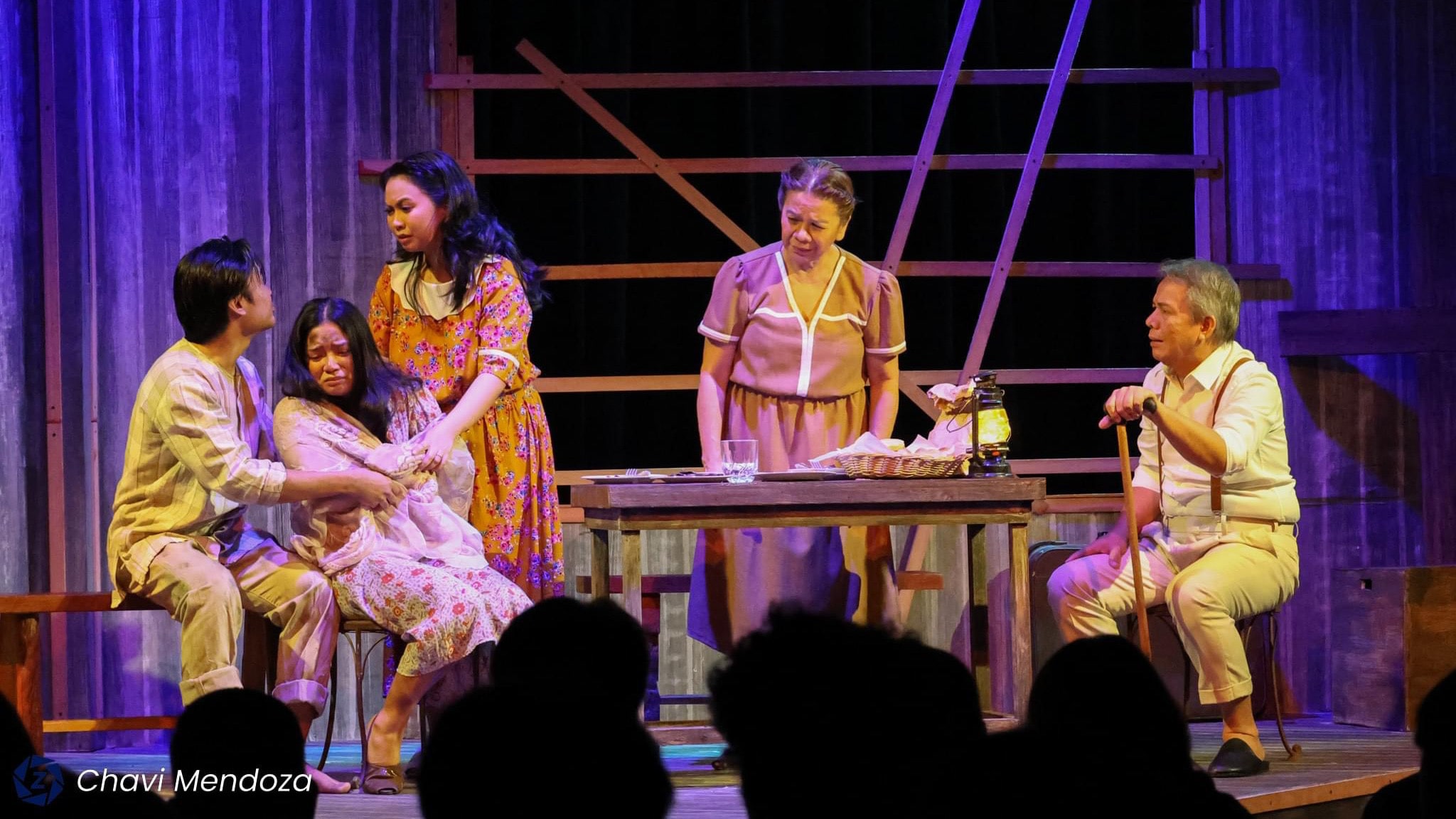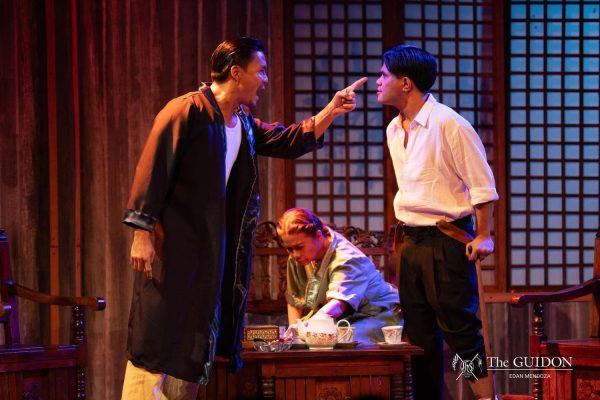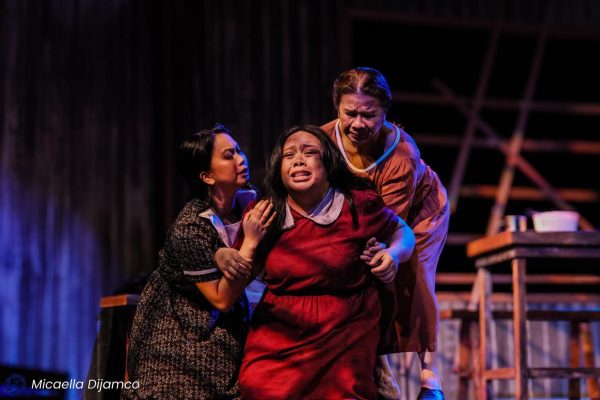
UNI-BASED REVIEW: Ateneo Entablado’s ‘Sa Tahanan ng Aking Ama’
This wartime family drama depicts the difficulty of maintaining rationality in the midst of devastation—even as the play struggles to move more cohesively.
If Ateneo Entablado’s new production, Sa Tahanan ng Aking Ama, teaches us anything—beyond its recounting of the Japanese invasion of the Philippines during World War II—it’s that our principles that may be based on objective information will always still be at the mercy of our lived experiences. This is what the prominent political family at the center of the play quickly comes to terms with as foreign invaders make their way to Negros, with the ensuing conflict tearing them apart from each other. No matter how much knowledge the family has or how steadfast they try to be, war arrives as an illogical, chaotic force that undoes all of that.
And for much of the production, itself a Filipino translation of Elsa Coscolluela’s play In My Father’s House, director and translator Jerry C. Respeto creates this same push and pull between firm, neutral objectivity and a visceral sense of anguish and dread. As a result, the show can feel quite inconsistent, as it attempts to move cohesively despite so many conflicting parts within it. Still, when it matters most, it paints a vivid picture of a people caught helplessly between two colonial powers.
Expansive Even Indoors
At first it might seem like Sa Tahanan ng Aking Ama might not be able to effectively capture the full, abject horror of war, as it takes place entirely in indoor spaces. But Ohm David’s wide, handsome set—transforming from a cozy sala and dining room to a shabby, hollow sacristy—still manages to communicate the family’s loss of security and privacy. Sturdy wooden furniture is swapped out for discarded religious images; and Respeto goes from blocking his actors in static arrangements to making the doorways at either end unable to stop whoever barges in next.
Just as effective are John Batalla’s lights, bathing the set in a gradient of color and really selling a sense of expansiveness. And between scenes, G.A. Fallarme’s video projections (with technical direction by Irish Pimentel) literally interrupt the actors with reminders that the fate of their country hangs in the balance, reported through newsreels only coming from either Japan or the United States.

L-R: Arkel Mendoza, Glecy Atienza, Johnrick Noynay; Photo Credit: Edan Mendoza from The Guidon
Clashing Voices
However, as the actors fill the stage and begin debating their swiftly changing fortunes, the show also displays signs of losing its balance. At the performance this writer watched, several members of the cast tripped over their words and accents trying to deliver Respeto’s dense, fast-paced dialogue. In the first act, it feels as if the performers are operating according to their own respective tones—which may be intentional, as none of them can see eye to eye. But the results can be distracting, as Glecy Atienza’s elocution-style of delivery clashes with Gie Onida’s more frantic line reading and how the children respond with varying degrees of concern.
But when the play allows its characters to settle into their own individual, complicated trajectories, the actors’ differences in performance also make more sense. Brothers Miguel and Franco (Arkel Mendoza and Johnrick Noynay, respectively for this performance) squabble over their patriotic duties in a way that’s clearly rooted in love rather than pride. Joy Delos Santos’ Cristy emerges as the family’s unexpectedly mature center, while Atienza’s matriarch uses her same demonstrative style to reach the depths of despair. And second act addition Marissa (Louis Paguia), together with the shellshocked Isabel (Iman Ampatuan) and servant-turned-fighter Emilio (Uriel Dolorfino) cut straight to the tragedy of how much trauma actually imprinted itself on Filipinos’ bodies during the war.

L-R: Joy Delos Santos, Iman Ampatuan, Glecy Atienza; Photo Credit: Micaella Dijamco
A Continuing Conversation
In a similar way to the performances, Respeto’s translation of Coscolluela’s writing is at first a challenge to work through—consisting of large chunks of didactic, information-heavy dialogue, reflecting the characters’ distance from the moral choices of war before they’re plunged headfirst into survival mode. It’s striking to hear these almost classroom-style discussions gradually turn into desperate, emotional exchanges that carry just as much truth in them. Although, even as the production goes on, the momentum of Coscolluela’s story doesn’t really carry over into succeeding scenes, up to an abrupt final tableau that feels more hurried than anything.
With that said, the characters do emerge on the other end of this show as compelling, complex human beings who’ve all just been forced into impossible decisions. The story initially sets them all up as opposing philosophies when it comes to resistance against the invaders or compromise with the new government. But ultimately they’re all really on the same page—victims of different generations of colonizers, and given only the illusion of a truly righteous choice. And while the play itself may be an imperfect vessel to convey this, even its rougher edges indicate that this is a continuing conversation to have, for every conflict our world finds itself in today.
Tickets: P400 – P850
Show Dates: Oct 9–27 2024
Venue: Doreen Black Box Theater, Aretê, Ateneo de Manila University, Quezon City
Running Time: approximately 2 hours and 30 minutes (including a 10-minute intermission)
Creatives: Elsa Cosccolluela (Playwright), Jerry C. Respeto (Director and Translator), Ohm David (Production Design), Jean Pierre Reniva (Costume Design), John Batalla (Lighting Design), Robert Yam (Sound Design), Vince Lim (Music), Nilo Beriarmente (Sound Engineer), G.A. Fallarme (Video), Jopie Sanchez (Make-Up and Hairstyling), Oliver Quintana (Dramaturgy)
Student Creative: Irish Pimentel (Technical Direction)
Cast: Jethro Tenorio, Gie Onida (Carlos), Glecy Atienza, Katski Flores (Amanda), Arkel Mendoza, Gino Ramirez (Miguel), Vino Mabalot (Franco), Bea Jose, Iman Ampatuan (Isabel), Chase Salazar, Joy Delos Santos (Cristy), Jeremy Mayores (Emilio), Adriane Ungriano, Miko Coroza (Benito), Charles Yee (Haroda)
Cast (Student Performers): Johnrick Noynay (Franco), Chantei Cortez, Louis Paguia, Rona Saunders (Marissa), Uriel Dolorfino, Jerome Loresco (Emilio), Gerald Morfe (Haroda), Mav Ang (Haroda/Sundalo), Lyle Viray, Julius Rafael, Kyle Tano (Victor), Sam Juada (Benito/Sundalo), Josh Olmos, Gab Pacardo, Joax Geronimo (Sundalo)
Company: Ateneo Entablado


Comments